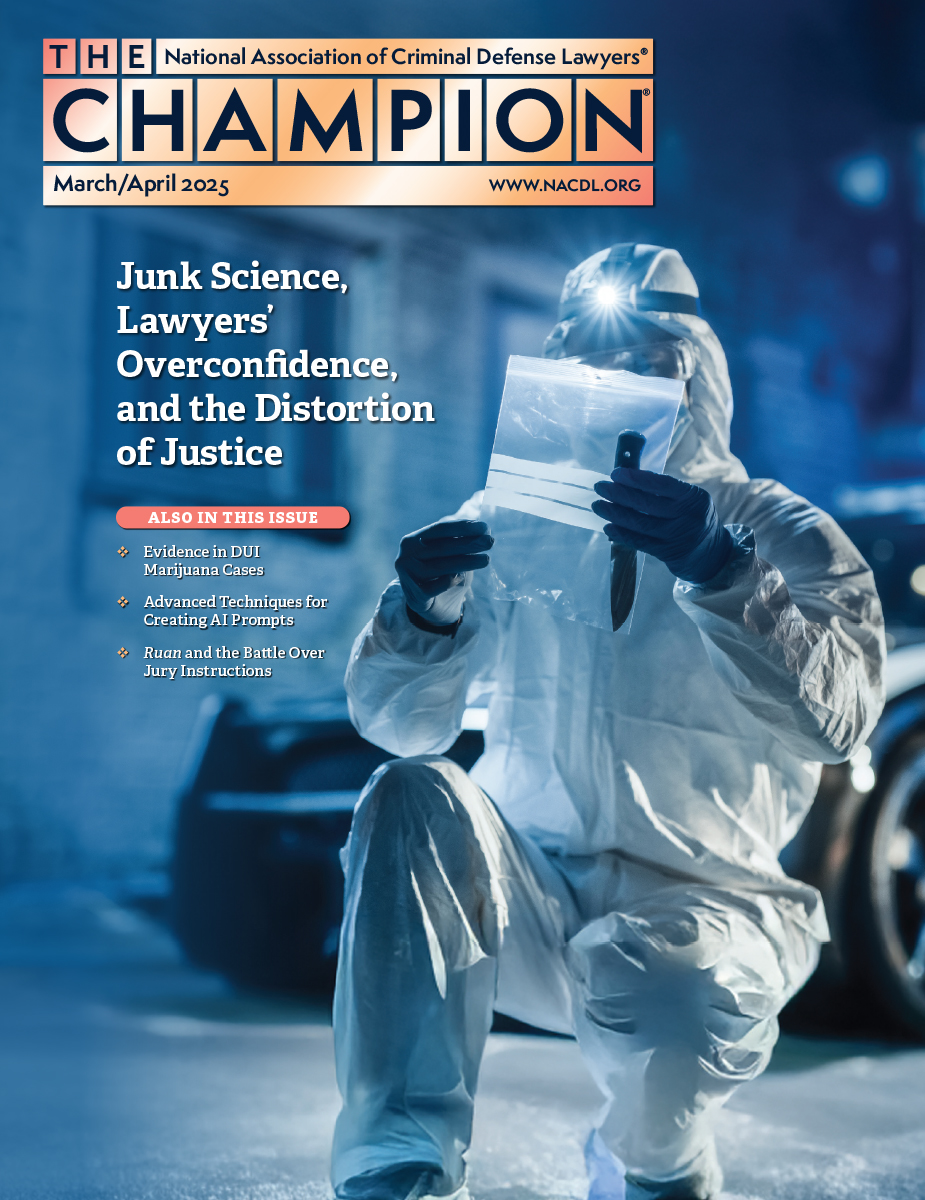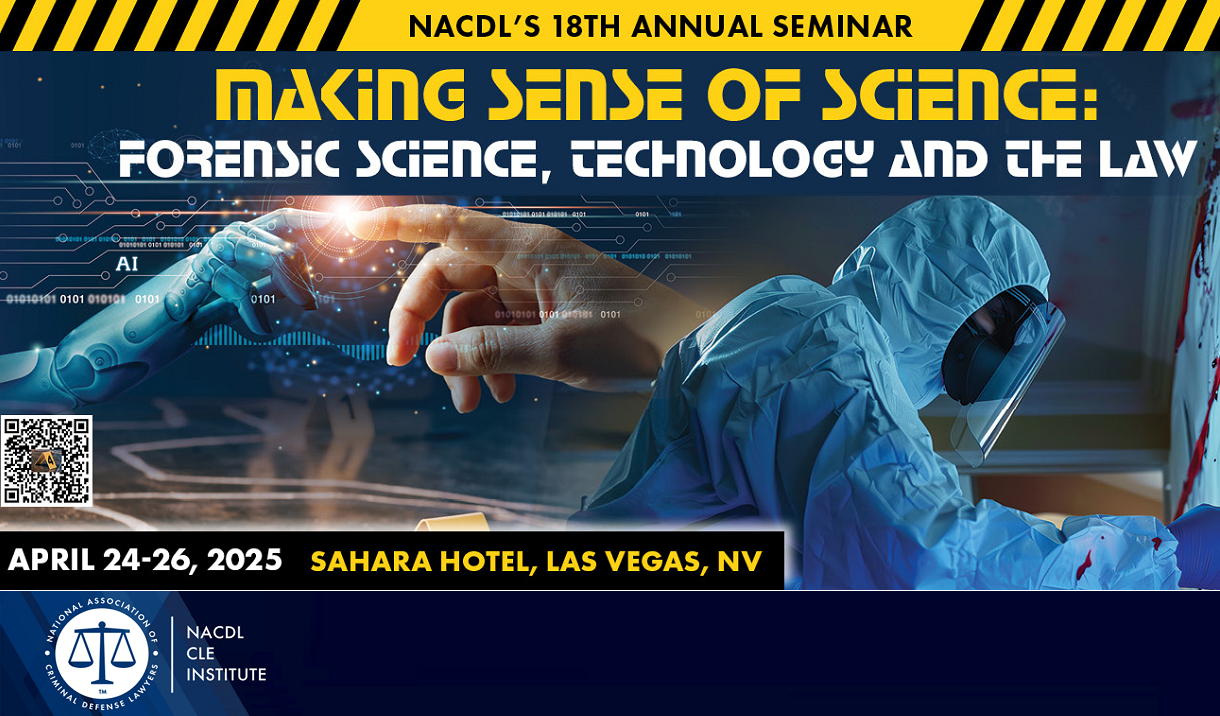Washington, DC (Apr. 10, 2017) – The Washington Post reported this morning that Attorney General Jeff Sessions "would not renew the National Commission on Forensic Science, a roughly 30-member advisory panel of scientists, judges, crime lab leaders, prosecutors and defense lawyers chartered by the Obama administration in 2013." Attorney General Sessions also "suspended an expanded review of FBI testimony across several techniques that have come under question, saying a new strategy will be set by an in-house team of law enforcement advisors."
According to a news release from the Department of Justice (DOJ), the DOJ is today filing a federal register notice (advance copy is linked here) requesting public comment on various forensic science issues before June 9, 2017.
In making the announcement, Attorney General Sessions applauded "the professionalism of the National Commission on Forensic Science" and acknowledged "the contributions it has made in this crucial field" of ensuring "accurate forensic science analysis."
"The reliance of law enforcement on questionable science and the overstatement of the reliability of that science has been a leading cause of the wrongful conviction of innocent people," said National Association of Criminal Defense Lawyers (NACDL) President Barry J. Pollack. "The reason the National Commission on Forensic Science has been so important is that it includes leading independent scientists, allowing an unbiased expert evaluation of which techniques are scientifically valid and which are not. NACDL is terribly disappointed that even while acknowledging the crucial role played by the National Commission on Forensic Science, the Attorney General has chosen to disband it. The Association hopes the DOJ will not abandon its recent steps toward promoting scientific independence and enhancing the reliability of all forensic evidence used in the criminal justice system."
As noted in a statement submitted for the record by NACDL in connection with a March 28, 2017, House hearing on The State of Forensic Science in the United States, faulty forensic science is the second leading cause of wrongful conviction. Indeed, to focus in on just one area, less than two years ago, in April 2015, the DOJ, FBI, Innocence Project, and NACDL jointly reported the FBI’s conclusion that FBI testimony on microscopic hair analysis contained errors in at least 90% of cases and that 26 of 28 FBI agent/analysts provided either testimony or reports with erroneous statements. The joint review focuses on cases worked prior to 2000, when mitochondrial DNA testing on hair became routine at the FBI.
There is no shortage of research evidencing the problems with various forensic disciplines and emphasizing the importance of scientific independence from law enforcement. In 2009, a blue-ribbon panel of experts funded by Congress and convened by the National Academy of Sciences (NAS) produced Strengthening Forensic Science in the United States, a landmark report that analyzed a range of forensic disciplines. In 2016, the President’s Council of Advisors on Science and Technology (PCAST) issued its own report, reaffirming many of the underlying conclusions of the 2009 NAS study. These reports, along with the seemingly endless litany of major scandals at forensic laboratories nationwide, reveal that the fundamental system for delivery of forensic science in the criminal justice system is broken, and that structural reform is needed.
NACDL convened its own task force in response to the 2009 NAS report, and issued a series of recommendations in 2010. That document endorsed: (1) forming a central, science-based federal agency that is independent of law enforcement and prosecution agencies, (2) improving the culture of science, (3) adopting a national code of ethics, (4) reinforcing the prerequisite of research, (5) providing greater education, (6) ensuring transparency and discovery, and (7) allocating greater defense resources, particularly for indigent defense services. Progress has been made on some of these objectives. But sadly, much of the promise of the 2009 NAS report and its associated recommendations remain unfulfilled, as the 2016 PCAST report attests. The use of flawed forensic evidence cannot be prevented unless the key principles articulated in the NAS and PCAST reports, as well as in NACDL’s Principles and Recommendations for Strengthening Forensic Science in the Courtroom, are implemented.
As detailed in full in its recent statement to the House Judiciary Committee’s Subcommittee on Crime, Terrorism, Homeland Security and Investigations, just prior to today’s announcement by Attorney General Sessions, NACDL urged Congress to: (1) provide a dedicated funding stream to support the existing National Commission on Forensic Science and either formally separate it from the DOJ, or ensure that it is not under the exclusive control of law enforcement, (2) establish mandatory accreditation, certification, and proficiency standards, (3) bolster the emerging culture of science and increased transparency in forensic work, and (4) enhance the support for defense attorneys commensurate with the increased prevalence and role of forensic science in criminal cases.
NACDL’s Principles and Recommendations for Strengthening Forensic Science in the Courtroom is available here. NACDL has also catalogued a number of crime lab and forensics scandals in recent years, which is available here.
A link to the National Research Council’s landmark 2009 report – Strengthening Forensic Science in the United States: A Path Forward – is available here. And a link to the President’s Counsel of Advisors on Science and Technology’s 2016 report – Forensic Science in the Criminal Courts: Ensuring Scientific Validity of Feature-Comparison Methods – is available here.
Contacts
Ivan Dominguez, Director of Public Affairs and Communications (202) 465-7662 or idominguez@nacdl.org
The National Association of Criminal Defense Lawyers is the preeminent organization advancing the mission of the criminal defense bar to ensure justice and due process for persons accused of crime or wrongdoing. A professional bar association founded in 1958, NACDL's many thousands of direct members in 28 countries – and 90 state, provincial and local affiliate organizations totaling up to 40,000 attorneys – include private criminal defense lawyers, public defenders, military defense counsel, law professors and judges committed to preserving fairness and promoting a rational and humane criminal legal system.











